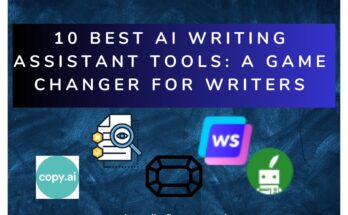Artificial Intelligence (AI) is no longer just a futuristic concept. Today, AI technology is shaping industries, businesses, and our daily lives in ways we couldn’t have imagined a few years ago. AI is everywhere, from smart assistants like Siri and Alexa to self-driving cars. But what exactly is AI technology, and how is it transforming the future? Let’s dive in.
What is AI Technology?
It refers to the development of machines and software that can perform tasks requiring human intelligence. These tasks include learning, reasoning, problem-solving, and even decision-making. AI isn’t just about robots replacing humans. It’s about improving processes, enhancing efficiency, and creating opportunities that didn’t exist before.
The idea of AI may sound complex, but you interact with it more often than you think. When Netflix suggests a movie, or when your phone predicts the next word in your text, that’s AI in action. It’s making decisions and learning from your behavior.
The Role of AI in Everyday Life
It has already been integrated into our daily routines. Whether you’re shopping online or chatting with a customer service bot, AI is working behind the scenes.
Virtual Assistants
Virtual assistants like Siri, Google Assistant, and Alexa have become household names. These assistants use technology to understand commands, answer questions, and even control smart home devices. They are constantly learning from user interactions to improve their performance.
Personalized Recommendations
Have you ever noticed how your Spotify playlists seem to get better over time? Or how Amazon recommends products you’re interested in? That’s AI technology at play. AI analyzes your habits, likes, and dislikes to provide tailored suggestions, creating a more personalized experience.
AI Technology in Healthcare
One of the most significant transformations AI is bringing is in healthcare. It is revolutionizing diagnostics, treatment planning, and even patient care.
Medical Imaging and Diagnosis
AI can analyze medical images, like X-rays and MRIs, faster and more accurately than humans. This helps doctors detect diseases earlier, leading to more effective treatments. For instance, AI-powered systems can now detect signs of cancer or neurological disorders that the human eye might miss.
Drug Discovery
It is also speeding up the process of drug discovery. By analyzing huge datasets, AI can predict how different compounds will interact with the body, helping scientists create more effective drugs at a faster rate.
AI Technology in Business and Industry
Businesses are benefiting tremendously from it. From automating mundane tasks to providing data-driven insights, AI is helping companies run smarter and more efficiently.
Automation and Efficiency
AI technology automates repetitive tasks like data entry, scheduling, and even customer service. Chatbots, powered by AI, can handle basic inquiries, freeing up human employees to focus on more complex issues. This increases productivity and reduces operational costs.
Data Analysis
AI can process massive amounts of data in seconds. For businesses, this means gaining insights from customer behavior, market trends, and financial reports faster than ever before. These insights help companies make informed decisions and stay ahead of their competition.
AI Technology in Transportation
AI technology is also transforming how we get around. Self-driving cars and intelligent traffic management systems are just a couple of ways AI is changing transportation.
Autonomous Vehicles
Companies like Tesla, Google, and Uber are working on self-driving cars that can navigate roads, avoid obstacles, and follow traffic laws without human intervention. AI technology allows these vehicles to process real-time data from sensors and cameras, making driving safer and more efficient.
Smart Traffic Systems
It is also being used to create smart traffic systems that can predict and manage traffic flow. By analyzing traffic camera and sensor data, AI can optimize traffic signals, reduce congestion, and even prevent accidents.
AI Technology in Education
Education is another sector experiencing a shift thanks to AI. The introduction of AI technology makes learning more accessible, personalized, and effective.
Personalized Learning
AI-powered platforms are offering personalized learning experiences. These systems can assess a student’s strengths and weaknesses and tailor lessons to meet their needs. This not only improves learning outcomes but also keeps students more engaged.
Automating Administrative Tasks
Educators are also benefiting from AI technology. It’s helping automate administrative tasks like grading, scheduling, and even answering student queries. This gives teachers more time to focus on teaching rather than paperwork.
The Ethical Dilemmas of AI Technology
While AI technology brings many benefits, it also raises ethical concerns. The growing reliance on AI has led to questions about privacy, job displacement, and even bias in AI systems.
Privacy Concerns
AI technology often relies on personal data to function, which raises concerns about how that data is used and protected. From facial recognition systems to online shopping habits, companies are collecting vast amounts of information. How this data is handled, and who has access to it, is a growing issue.
Job Automation and Employment
As AI continues to automate tasks, there’s growing concern about the impact on jobs. While AI technology creates new opportunities, it also has the potential to displace certain roles. The challenge is finding ways to balance AI-driven efficiency with protecting jobs and upskilling the workforce.
AI Technology in Entertainment
The entertainment industry is also tapping into the power of AI. From creating new music to enhancing video games, AI technology is opening up exciting possibilities.
Content Creation
AI can now compose music, write scripts, and even generate video content. Some companies are using AI technology to create movie trailers, while others are experimenting with AI-generated video games. The possibilities for AI to reshape entertainment are endless.
Enhanced User Experience
Streaming platforms like Netflix and YouTube use AI technology to recommend content based on user preferences. This not only enhances the user experience but also keeps people engaged for longer periods, making AI a powerful tool in media consumption.
AI Technology in Finance
The finance industry is another area being transformed by AI technology. From fraud detection to automated trading, AI is helping financial institutions operate more efficiently and securely.
Fraud Detection
AI technology is excellent at detecting unusual patterns in data, making it a valuable tool for identifying fraudulent activities. Banks and financial institutions use AI to monitor transactions in real time, catching suspicious activities before they become significant issues.
Robo-Advisors
AI-powered robo-advisors are helping people manage their investments. These digital platforms provide personalized investment advice based on algorithms, making financial planning more accessible to a broader audience.
The Future of AI Technology
The future is incredibly bright. As AI continues to evolve, it will bring even more innovations to reshape our world. From solving complex global challenges to making daily tasks easier, AI is here to stay. While there are concerns about its ethical implications, the potential benefits far outweigh the risks.



